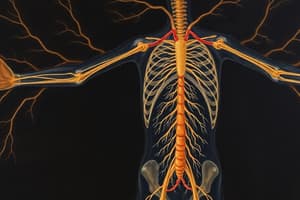Podcast
Questions and Answers
What are the two most fundamental systems responsible for control and coordination in the human body?
What are the two most fundamental systems responsible for control and coordination in the human body?
- Nervous system and Endocrine system (correct)
- Nervous system and Digestive system
- Respiratory system and Circulatory system
- Muscular system and Skeletal system
Which part of the nervous system includes the brain and spinal cord?
Which part of the nervous system includes the brain and spinal cord?
- Central nervous system (correct)
- Peripheral nervous system
- Somatic nervous system
- Autonomic nervous system
Which type of neurons transmit information from the body to the CNS?
Which type of neurons transmit information from the body to the CNS?
- Reflex neurons
- Sensory neurons (correct)
- Interneurons
- Motor neurons
What is the primary cell type of the nervous system responsible for transmitting information?
What is the primary cell type of the nervous system responsible for transmitting information?
Which part of the nervous system consists of nerves that connect the CNS to the rest of the body?
Which part of the nervous system consists of nerves that connect the CNS to the rest of the body?
What is the main difference between the nervous system and the endocrine system?
What is the main difference between the nervous system and the endocrine system?
Which of the following is NOT a function of hormones?
Which of the following is NOT a function of hormones?
When your blood sugar levels drop, which hormone is typically secreted to stimulate cells to absorb glucose?
When your blood sugar levels drop, which hormone is typically secreted to stimulate cells to absorb glucose?
In a reflex arc, where does the stimulus travel to be processed before a response signal is sent through motor neurons?
In a reflex arc, where does the stimulus travel to be processed before a response signal is sent through motor neurons?
What role does cortisol play in the body when a person is stressed?
What role does cortisol play in the body when a person is stressed?
Why are reflexes like the flexor withdrawal reflex important for the body?
Why are reflexes like the flexor withdrawal reflex important for the body?
Flashcards are hidden until you start studying
Study Notes
Control and Coordination: Understanding the Complex Systems
The human body is an intricately orchestrated machine, a symphony of systems that work together to ensure our survival and proper functioning. Two of the most fundamental systems responsible for control and coordination are the nervous system and endocrine system. In this article, we'll explore these systems and their vital components, such as neurons, hormones, and reflexes, to gain a deeper understanding of how they work in unison to maintain our bodies' delicate balance.
The Nervous System
The nervous system is the body's communication network, transmitting information from the brain and spinal cord to various body parts, and vice versa. It consists of two main parts: the central nervous system (CNS) and the peripheral nervous system (PNS). The CNS includes the brain and spinal cord, while the PNS consists of nerves that connect the CNS to the rest of the body.
Neurons, the primary cells of the nervous system, are specialized cells with unique structures designed for transmitting information. They are classified into three types: sensory neurons (afferent), motor neurons (efferent), and interneurons. Sensory neurons transmit information from the body to the CNS, while motor neurons transmit information from the CNS to muscles and glands. Interneurons are within the CNS and communicate with sensory and motor neurons, processing and integrating information.
The Endocrine System
While the nervous system is responsible for transmitting information quickly, the endocrine system does so more slowly but with long-term effects. The endocrine system consists of glands that secrete hormones into the bloodstream, where they travel to target organs or tissues to produce specific responses.
Hormones are chemical messengers that regulate various body processes, such as growth, metabolism, and reproduction. Examples of hormones include insulin, which regulates blood sugar levels, and estrogen, which plays a role in female reproductive processes.
Neurons and Hormones Working Together
While the nervous and endocrine systems have distinct functions, they often work together to maintain balance and coordination. For example, when your blood sugar levels drop, the pancreas secretes the hormone insulin, stimulating cells to absorb glucose. At the same time, the nervous system sends signals to the liver to produce glycogen, a storage form of glucose.
Similarly, when you are stressed, the nervous system triggers the release of the hormone cortisol, which prepares the body for action. However, over time, excessive cortisol release can harm the body, making it essential to balance the input from the nervous system with the endocrine system's hormonal responses.
Reflexes
Reflexes are rapid, involuntary responses to stimuli. For example, when your finger touches a hot object, you will immediately pull it away, a reflex called the flexor withdrawal reflex. The stimulus, heat, travels through sensory neurons to the CNS, where it is processed and response signals are sent through motor neurons, causing the muscle to contract and the finger to be withdrawn.
Reflexes like these are essential for maintaining homeostasis, ensuring that our bodies are safe and functioning properly.
Conclusion
The nervous and endocrine systems work in close collaboration to maintain control and coordination in the human body. Neurons and hormones interact to regulate a wide range of physiological processes, and reflexes allow us to respond quickly to our environment. Understanding these systems, their components, and their interactions will allow us to appreciate the complexity and precision that underlies our everyday functioning.
Studying That Suits You
Use AI to generate personalized quizzes and flashcards to suit your learning preferences.




